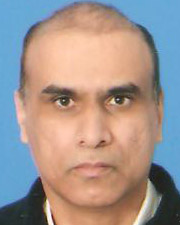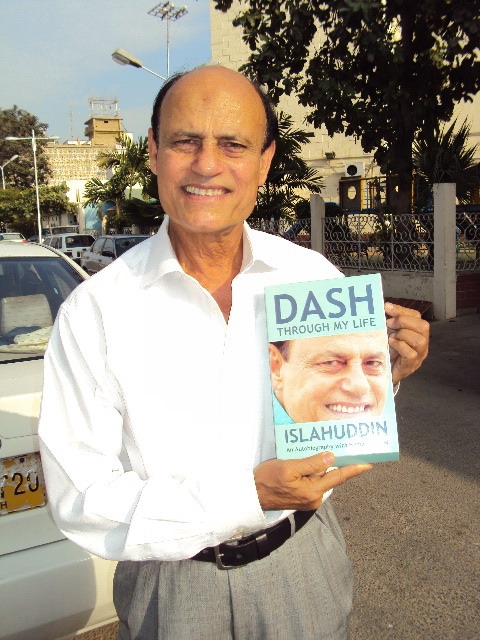Share
Very few sportsmen have lived such an eventful and colour life as Pakistan’s hockey great Islahuddin Siddiqui has had; for more than 40 years now.
This hockey legend Islahuddin Siddiqui, World Cup and triple Asian Games gold medallist have come out with his autobiography.
The fastest man in field hockey, who used to blunt the penalty corner strikes of Paul Litjens and Storedter, with his deadly dash that burst from the cage like lightening, has appropriately named his labour of love as ‘Dash Through My Life’.

Islah is perhaps the only forward in history to gain more fame for saving goals than scoring goals despite being the world’s best forward of his times.
A sportsman’s autobiography is always welcomed, as it also immensely contributes to the sports literature and its history.
And Islah’s book has exactly done the same.
Islah got hooked up to sports very early, and was adept at many sports, thankfully he chose to focus on hockey on his father’s advice. This multi-talent helped him to become a sharp forward as well as a great dasher (chargers in present day parlance).
He was only 19 when he won the national colours in 67 though he missed out the Mexico Olympics next year, which Pakistan won. His first big tournament was the 70’ Asiad, after that was firmly ensconced in the national side till 1978.
In fact, 1978 was the annus mirabilis of Pakistan hockey, when the green shirts won three major titles under his command: the World Cup, Asian Games and the inaugural Champions’ Trophy.
Islah narrates the happenings, on and off the fields, in a very fascinating manner. The Olympics and the World Cups have rightly gained prominence, though others like the ice- breaking Indo Pak Series of 1978 are not lost sight of.
He also delves deeply into the controversies — the events during the 72’ Olympics resulting in ban on the entire Pakistan team, the disputed goal against Pakistan in the 1975’ World Cup final, the much debated shuffling of Pakistan’s forward line in the semifinal 1976 Olympics and others.
Sporting narrations are interspersed with interesting anecdotes and hilarious incidents which make the book even more enjoyable.
Japan’s miraculous victory over Holland in the first World Cup, which enabled Pakistan to reach the semis, his act of returning the over paid money to a bank clerk; his unbelievable speed leading him to often dope tested; Islah forgetfully overstaying in India causing alarm across both sides of the border; Malaysian girl proposing for marriage the distorted report of which that caused moments of anxiety backhome – you encounter such narrations often.

Islah has also made quite a few revelations. These include numerous altercations with Nur Khan, then president of the PHF, Nur Khan’s attempt to change the location and reduce the size of the plots that Pakistan president promised to the players, and significantly, the pressure exerted by him on Islah to retire.
Islah interestingly lets us know how, frustrated by his dashes, a legendary Dutch penalty corner deliberately struck him on his knee!
After the 76 Olympics, the manager M.H. Atif, forced Islah, who was on a wheelchair, to accompany the team for friendly games in Moscow rather return home.
He was called time and again to revive the sinking fortunes of the national team in the managerial role. But as soon as the side showed signs of recovery, he was sidelined.
Islah’s long and enviable career saw him meeting celebs from different walks of life. These include Pakistan and India’s rulers, Bollywood and Lollywood stars, politicians, test cricketers, leading businessmen, etc. Some of these relations have been really special; President Zia ul Haq made a personal donation towards his benefit match. Some of them like Dilip Kumar became his life long friends.
Widely acknowledged for his acumen for public relations, and enterprising nature, Islah was perhaps the first hockey player in the world to have his benefit match. He also tells about his successful endeavour to form Pakistan’s first ever national veterans’ team and raising funds for team’s travel to compete in the Veterans World Cup.
There have also been disappointments and tragedies along the way. Missing out on the Olympic gold haunts him. He describes the demise of former Pakistan hockey captain Munawwar uz Zaman, right in front of him very poignantly.
Like all his compatriots, Islah is very much saddened by Pakistan hockey’s continuous decline. Towards the end, in as many as 15 pages, he elaborates on the causes of this downfall and also suggests short, medium and long term measures to stem the decline and regain the glory. One of the few Asians who fell in love with the astro turf at first sight, he sheds light on the reasons behind the Europeans’ ascendancy and gives his views about the world hockey scene in general.
Chronologically written with the smooth flow of the text, the autobiography has a number of beautiful photographs. These unmistakably capture the various facets of the author. His playing days images are memorable, collector’s items.
The book has a beautiful cover, legendary Paul Litjens — whose record of most goals in international hockey lasted for more than two decades – and Ajitpal Singh, India’s only World Cup winning captain, have given forewords.
The book is a wonderful read not only for hockey followers and sports lovers but also for those who yearn for good books especially biographies.
Ijaz Chaudhry writes on hockey and other sports. For more about him and
examples of his published work, visit www.sportscorrespondent.info


